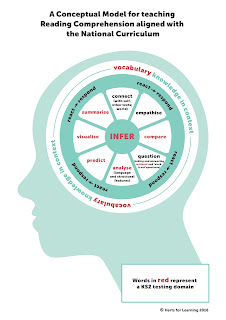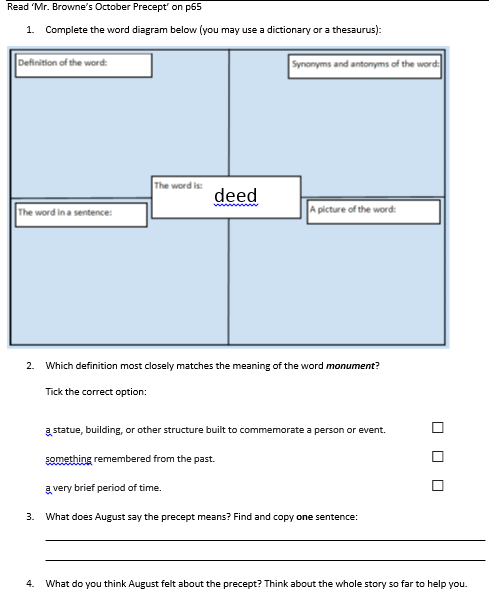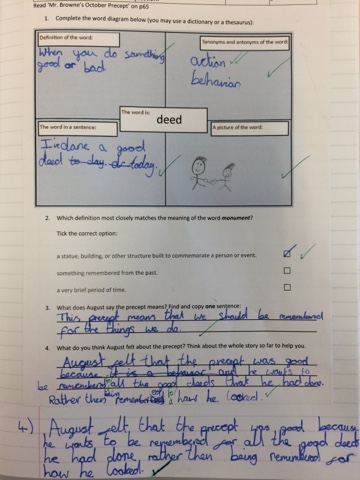2d: make inferences from the text / explain and justify inferences with evidence from the text
 Penny Slater's helpful article 'Reading Re-envisaged' explores the links between vocabulary knowledge and inference skills. Her conceptual model (pictured left) represents how inference skills rely on good knowledge and understanding of vocabulary. In her own words:
Penny Slater's helpful article 'Reading Re-envisaged' explores the links between vocabulary knowledge and inference skills. Her conceptual model (pictured left) represents how inference skills rely on good knowledge and understanding of vocabulary. In her own words: "...the model signifies the importance of vocabulary knowledge. If we consider each circle to be a moat which the children must cross before they are able to access the skills within the innermost circles, then we see clearly that they will not get very far if they do not understand the meanings on the words on the page. This chimes with what teachers are finding in their classrooms: lack of knowledge of vocabulary is a complete blocker. You can’t make any inroads into comprehension without addressing this issue first."
So, another cognitive domain comes into play, one which children must be confident with if they are going to be able to make inferences:
2a: give / explain the meaning of words in context
This approach also explore the possibility that development of inference skills could be supported through the use of retrieval skills.
2b: retrieve and record information / identify key details from fiction and non-fiction
The theory that I have been trialing is that inference skills can be taught by first studying the vocabulary used and then retrieving relevant information before going on to make inferences about a text. If inference is 'a conclusion reached on the basis of evidence and reasoning' then first a reader must be able to identify where the evidence is (retrieval) and before that the reader needs to understand the words used to present the evidence. In the model I propose (see right) the understanding of vocabulary is the foundation on which information retrieval is built, which in turn provides the support for making inferences.
The Practice
1. Decide on an inference question (2d); the question stems based on the 2016 KS2 reading test made available by Herts for Learning on their blog are really useful for this.
2. Begin to work backwards - work out where in the text the children need to go to locate useful evidence and ask a suitable retrieval question (2b).
3. Continue to work backwards - which words or phrases do the children need to understand in order to be able to understand the evidence then ask a careful vocabulary question (2a).
4. Once this process is complete (it may take a while at first), check that the 2a and 2b questions will adequately lead the children into answering the 2d question. If not, go back and tweak the questions.
For a more in-depth exploration of this technique, including examples of questions: http://thatboycanteach.blogspot.co.uk/2016/10/scaffolding-inference-trialling.html
Many of the examples from the blogpost are available for download here:
https://www.tes.com/teaching-resource/-11416437



















